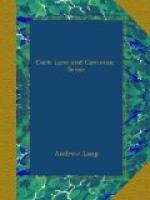In Cock Lane and Common-Sense an attempt is made to reconcile these rather hostile sisters in science. Anthropology ought to think humani nihil a se alienum. Now the abnormal and more or less inexplicable experiences vouched for by countless living persons of honour and sanity, are, at all events, human. As they usually coincide in character with the testimony of the lower races all over the world; with historical evidence from the past, and with rural Folklore now and always, it really seems hard to understand how anthropology can turn her back on this large human province. For example, the famous affair of the disturbances at Mr. Samuel Wesley’s parsonage at Epworth, in 1716, is reported on evidence undeniably honest, and absolutely contemporary. Dr. Salmon, the learned and acute Provost of Trinity College, Dublin, has twice tried to explain the phenomena as the results of deliberate imposture by Hetty Wesley, alone, and unaided. {0a} The present writer examined Dr. Salmon’s arguments (in the Contemporary Review, August, 1895), and was able, he thinks, to demonstrate that scarcely one of them was based on an accurate reading of the evidence. The writer later came across the diary of Mr. Proctor of Wellington, near Newcastle (about 1840), and found to his surprise that Mr. Proctor registered on occasion, day by day, for many years, precisely the same phenomena as those which had vexed the Wesleys. {0b} Various contradictory and mutually exclusive theories of these affairs have been advanced. Not one hypothesis satisfies the friends of the others: not one bears examination. The present writer has no theory, except the theory that these experiences (or these modern myths, if any one pleases), are part of the province of anthropology and Folklore.
He would add one obvious yet neglected truth. If a ‘ghost-story’ be found to contain some slight discrepancy between the narratives of two witnesses, it is at once rejected, both by science and common-sense, as obviously and necessarily and essentially false. Yet no story of the most normal incident in daily life, can well be told without some discrepancies in the relations of witnesses. None the less such stories are accepted even by juries and judges. We cannot expect human testimony suddenly to become impeccable and infallible in all details, just because a ‘ghost’ is concerned. Nor is it logical to demand here a degree of congruity in testimony, which daily experience of human evidence proves to be impossible, even in ordinary matters.
A collection of recent reports of ‘fire-walking’ by unscorched ministrants, in the South Seas, in Sarawak, in Bulgaria, and among the Klings, appeals to the present writer in a similar way. Anthropology, he thinks, should compare these reports of living witnesses, with the older reports of similar phenomena, in Virgil, in many books of travel, in saintly legends, in trials by ordeal, and in Iamblichus. {0c} Anthropology




